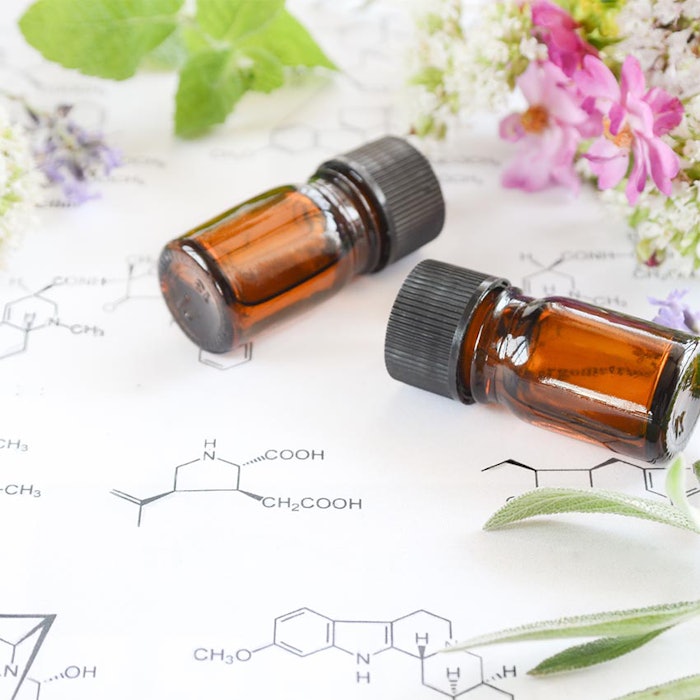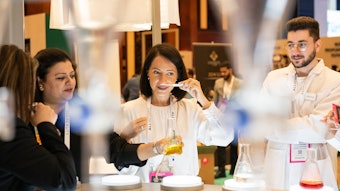
Held at the Chamber of Commerce and Industry in Paris, France on Jun. 4, 2019, members and organizers of the European Federation of Essential Oils (EFEO) gathered to discuss the future of naturals through the perfumery, policy and sustainability lenses.
According to its mission statement, EFEO “aims to represent, protect and promote the interest of production and trade of essential oils and related products within Europe, and to lobby for the defense of these products.”
Perfumery and Policy: Adapting to Safety Standards
From the perfumery point of view, Maurice Roucel, master perfumer, Symrise, discussed the the growth of naturals as a result of new raw materials and the evolution of niche perfumery.
Many companies today are looking to control its own production and developing a more transparent supply chain from flower to bottle. This direction is largely due to the industry’s shift away from single raw material sources (think the catastrophic effects of losing countless aroma chemicals in the 2017 BASF fire) and towards diversifying partnerships with more growers and suppliers. With the rise of niche perfumery, the need to be unique and different is driving the industry towards new rare materials, Roucel suggested exploring the Amazon as a possibility to drive quality and differentiation in formulations. Yet, despite the growing demand for naturals, the International Fragrance Association (IFRA) regulations continue to limit the perfumery palette as certain raw materials are restricted at the chemical component level due to evolving safety standards (take methyl eugenol in rose). Roucel believes a perfumer’s creative flexibility is essential during these shifting regulatory policies. “You have to adapt yourself to changing regulations,” he said.
What exactly goes into risk safety assessment for naturals? Danielle Botelho, safety assessment manager for the Research Institute of Fragrance Materials (RIFM) presented her talk, “How to Tackle NCS Risk Assessment.” Short for natural complex substances, NCS are being tested to ultimately determine toxicology effects for use in finished cosmetic and fragrance products. Currently, RIFM’s database holds over 6,000 materials in its fragrance database, yet whole oil data is limited.
Botelho explained the organization is currently developing protocols as data evolves and will be examining citrus materials during this pilot test. Driving factors in this pilot project of NCS include examining composition, diversity and exposure. In order to understand how consumers are using products and the concentration levels added by companies, RIFM partnered up with Creme global, a data science platform, to determine exposure on consumers. To communicate its findings, RIFM will continue to partner with IFRA and other trade associations as the research evolves.
Related: RIFM and CSIR-CIMAP Work to Standardize Essential Oil Quality
Toxicology testing and datamining are primary avenues towards determining the safety of NCS. In his presentation titled “Sustainable Essential Oils and Pharma Requirements,” Yves Barbin, vegetal active ingredients director, Pierre Fabre Lab reinforced Botelho’s explanation on developing more robust data rooted in scientific research and clinical data for pharmaceutical quality essential oils. He also suggested that fair trade supply chains be implemented to ensure safety compliance from all players. Developing a more robust database requires industry partnerships between research firms, houses and dataminers.
Related: Assessing the Sustainability of Natural Ingredients with LCA
Jean-François Quarré, EFEO president, discussed the role of pesticides in naturals, and how members can ensure the quality of its raw materials through EFEO’s partnership with the European Research Institute on Natural Ingredients (ERINI). ERINI’s research facility offers aroma, perfume and cosmetic analysis. Through the partnership, EFEO members can submit samples for a reduced cost to be tested for pesticide residue, in which information can be contributed to ERINI’s growing database of pesticide residue knowledge.
With essential oil producers investing more in NCS research and building a more dynamic database, the next question surrounded import and export duties for essential oils. Lutz Düshop, attorney at law and secretary general at EFEO provided a legislation update surrounding implications in trade wars (EU, USA and China) and Registration, Evaluation, Authorization and restriction of Chemicals (REACH) challenges. EFEO submitted a statement to the EU in response to the duties imposed on the EU by the US and the US by the EU, as well as taxes from China to the US (25% tax) on many key raw materials including citrus fruit, bay leaf, bay oil and citral derivativesa. As a result of the tariffs, companies are experiencing shifting purchasing and sourcing problems, with escalating prices for consumer products on the shelves. REACH requires preregistration of substances, driving even more limitations behind NCS buying and purchasing. As of Jun. 1, 2018, if a registration dossier is incomplete for pre-registered substances, EU imports of essential oils for cosmetic purposes and the use of essential oils by a customer are prohibited. Until the dossier is submitted, imports are suspended in EU customs and may be sold as these materials are considered imported.
Click here for REACH-related documents.
Footnote:
a Fragrance Creators Section 301 Comments 9-6-18










